|
|
|
Sort Order |
|
|
|
Items / Page
|
|
|
|
|
|
|
| Srl | Item |
| 1 |
ID:
181940
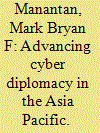

|
|
|
|
|
| Summary/Abstract |
The stability in the cyber domain is rapidly deteriorating on several fronts marked by increasing sophistication of cyberattacks, declining consensus on global internet governance and intensifying great power competition. These challenges were critical turning points among nation-states to recalibrate prevailing cyber diplomatic engagements. This article investigates the increasing prominence of deterrence in the practice of cyber diplomacy in the Asia Pacific. Using Japan and Australia as case studies, it argues that both states continue to adhere to the conceptual tenets of cyber diplomacy, however, in practice, there is a growing integration of deterrence—cyber capabilities and public attribution/naming and shaming—in the equation at varying degrees and intensities. The article endeavours to make two important contributions: First, revitalize the existing cyber diplomacy framework by challenging the extant literature’s view of deterrence’s limited application—underpinned by cold war analogies—and the implausibility of conducting attribution of cyberattacks. Secondly, evaluate Japan and Australia’s cyber diplomacy based on empirical evidence. Key findings suggest that deterrence reinforces/complements the fundamental elements present in the cyber diplomacy playbook. While slight variation exists, there is a strong acquiescence between Japan and Australia to expand existing cyber cooperation to tackle critical and emerging technologies, supply chain, and data governance.
|
|
|
|
|
|
|
|
|
|
|
|
|
|
|
|
| 2 |
ID:
181941
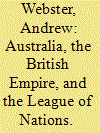

|
|
|
|
|
| Summary/Abstract |
This article reviews the most recent volume in the series of archival document collections on the history Australia’s external affairs, Documents on Australian Foreign Policy, covering the years 1920 to 1930. It focuses upon two main themes of central importance to the Australian global presence in that decade: the organisation and purposes of the Empire-Commonwealth and the impact of the League of Nations.
|
|
|
|
|
|
|
|
|
|
|
|
|
|
|
|
| 3 |
ID:
181939
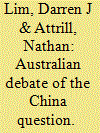

|
|
|
|
|
| Summary/Abstract |
Debate within Australia regarding the bilateral relationship with China is complex, contentious and often lacks clarity. Informed by basic international relations theory, we identify two dividing lines within this debate. First, whether understanding China’s behaviour is most effectively done through a unitary actor framework, or whether it is essential to look inside the ‘black box’ of the Chinese party-state. Second, whether one is more concerned about the ‘Thucydides trap’ or ‘Munich’—that is, are the consequences of an overreaction or an underreaction more concerning when interpreting China’s intentions and responding to perceived threats. These dividing lines generate four ideal-type policy viewpoints that we label Balancers, Hedgers, Engagers and Reformers, and apply in the Australian context. We then overlay our framework onto the public debate in Australia, selecting a specific bounded case study: commentary and analysis concerning China’s behaviour throughout the COVID-19 pandemic of 2020, in particular responding to Australia’s call for an international inquiry. Our objective is to progress an often circular debate by offering an accessible frame that clarifies and synthesises fundamental disagreements.
|
|
|
|
|
|
|
|
|
|
|
|
|
|
|
|
| 4 |
ID:
181937
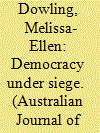

|
|
|
|
|
| Summary/Abstract |
In today’s virtually interconnected world, it is now cheaper, faster and less risky for malign foreign entities to conduct non-kinetic subversion of adversaries. This commentary aims to promote debate about whether digitisation has reshaped foreign interference or whether changes to the conduct of covert subversion operations simply mask what at its core is an unchanged and perennial fixture of geopolitics. It calls into question the concept of foreign interference in a world wherein the boundaries of foreign and domestic are beginning to dissolve in the digital theatre of battle. In this piece, I identify several core ways in which digitisation has revolutionised tactics of interference and argue that this differentiates today’s foreign interference from analogue-era espionage. I also explore how digitisation has expanded the range of potential threats and targets which has exacerbated the notorious cyber attribution problem and poses a unique threat to liberal democracies.
|
|
|
|
|
|
|
|
|
|
|
|
|
|
|
|
| 5 |
ID:
181936
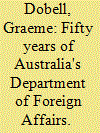

|
|
|
|
|
| Summary/Abstract |
In its 50 years, Australia’s Department of Foreign Affairs (and later Department of Foreign Affairs and Trade) has become a great department of state. Foreign is an important conglomerate, doing diplomacy, trade, aid, and spying. In the Canberra system, though, Foreign has an ‘anaemia’ problem caused by chronic underfunding. Measured as a proportion of the Commonwealth budget, spending on diplomacy is halving in only three decades. Anaemia is the effect; the causes are a formidable set of forces pressing against the department over those 50 years: the evolution and empowerment of Australia’s presidential prime minister; the birth of ministerial minders; public service managerialism; Canberra’s national security system—and mindset—in the twenty-first century; globalisation and the digital era: every government department has its own bit of foreign policy; political choices: Australia’s two parties of government— Liberal and Labor—often buy something other than good foreign policy. Plus, important bits of the Liberal Party see DFAT as ideologically tainted.
|
|
|
|
|
|
|
|
|
|
|
|
|
|
|
|
| 6 |
ID:
181938


|
|
|
|
|
| Summary/Abstract |
The Women, Peace and Security (WPS) agenda is anchored in ten United Nations Security Council resolutions addressing gender equality and women’s rights in peace and security governance. The codification of the WPS agenda in the adopted resolutions establishes standards of practice to be adopted by UN member states and entities to prioritise women’s role as agents in peace and security settings and respond to women’s specific security needs. This research explores the influence of UN Security Council resolution 2242, adopted by the Council in 2015, particularly the provisions related to counter-terrorism and preventing and countering violent extremism (CT and P/CVE). Drawing on analysis of policy documents and interview data from the United Kingdom, Australia, and Sweden, the article argues that resolution 2242 is driving a degree of engagement, if not alignment, between WPS and CT and P/CVE. Further, the important differences between the operationalisation of the norms embedded in the resolution in the case study countries suggest that it would be fruitful for WPS analysts to engage in further research about how norm diffusion interacts with policy development.
|
|
|
|
|
|
|
|
|
|
|
|
|
|
|
|
|
|
|
|
|